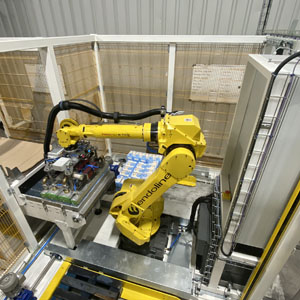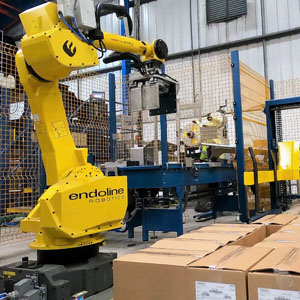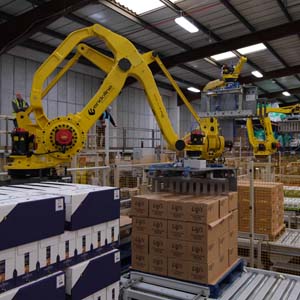Endoline Robotics disrupts automated palletising market
Launching just months before the first Covid-19 lockdown, Endoline Robotics Managing Director Andrew Yates reflects on how their new automated case packing and palletising operation has secured multi-million pound orders in such a short timeframe and increased turnover tenfold in under two years.
Andrew also divulges the market drivers that saw the company pivot their automation strategy from ‘plug and play’ palletising systems to high-spec turnkey lines.
The shift in strategy resulted in Endoline Robotics winning in the ‘Best New or Small Company’ category at the Robotics & Automation Awards earlier this year.
The decision to launch Endoline Robotics was underpinned by its parent company’s strong 40-year history in automated case erecting and sealing systems installed by global manufacturers. Backed by robust market intelligence that demand for end-of-line automated palletising systems was on the cusp of a huge growth trajectory, it rapidly became apparent to Endoline’s leadership team that customers were seeking more than just a well-supported robot palletiser. To corroborate this, enquires for a complete premium package connecting upstream packing operations with automated downstream palletising began to roll in.
Leveraging Endoline’s in-house technical design and engineering expertise and strong OEM partnerships, ERL realigned its strategy. As soon as the lockdown restrictions lifted, the business secured several credible leads to engineer complex, high-value full turnkey automation projects.
Andrew recounts: “For virtually two years, automation enquires virtually dried up and investments were put on pause. Meetings and demonstrations switched to virtual platforms. Visits to essential manufacturers were minimised.”
However, as a supplier of equipment to essential businesses, the palletising start-up was well-placed to react to leads and design connected, automated systems that would strengthen UK manufacturing and increase productivity.
Responding to retail demands
The scope of product applications Endoline Robotics has delivered solutions for – from pet food to flour, cereals to nuts and bolts – showcases the variety of customised palletising robotic payloads, interoperability, safety standards and compact footprints that these innovative turnkey designs can accommodate.
Every automated installation to-date has delivered significant labour savings. Enabling manufacturers to relocate workers to more value-enhancing tasks.
Carr’s Flour Mills was the first project to go live. Responding to the ‘Home Baking’ boom, Carr’s needed to process and palletise 167,000 bags of flour weekly. Running 24/7, Carr’s doubled its production for one major supermarket chain, from 120 to 250 tonnes per week.
“We had always planned to automate the line. Constrained by the manual process, Endoline’s robotic solution has enabled us to redeploy eight workers to other, more skilled areas of the business. Quality and efficiency has improved, and we now have greater flexibility to increase productivity for our customers,” comments Carr’s Operations Director Ben Clark.
Making history
Valued at over £2.5 million, the installation in May 2023 at Life Health Foods marked a pivotal turning point for automated palletising in the UK. It was also the biggest and most complex order in Endoline’s history.
In 12-months, the team designed and installed a fully-operational start-to pallet cell comprising three Fanuc M410 palletising robots, over 250 metres of straight, spiral and overhead conveyor, integrated with a centralised ERP system. Notably, palletising was relocated from the clean production space to the Peterborough plants’ adjacent warehouse located over 140 metres away.
All of this was done without increasing the physical footprint. What’s more, the switch from manual palletising to fully automating the handling of 100 different SKUs and product cases, was delivered without shutting production down.
Now fully operational, LHF now the increased capacity to palletise 86,000 individual product cases every 24-hours.
Group HSE Manager at Life Health Foods (UK) Jon Edgley enthuses: “This fully automated palletising turnkey line has increased the versatility for our busy plant. We have already observed that staff morale is higher, labour costs are down, line speeds improved, and palletising errors eliminated. There are also significant workforce health & safety and stock control benefits.”
Testament to the accelerated drive towards smart, fully-automated production facilities in the UK, Andrew reports: “Endoline Robotics has delivered five high value systems in a short timeframe, each of which meets a very specific customer need. For an SME, this is quite unprecedented. Yet, this validates the appetite among UK manufacturers for customised, modular automation systems that can be integrated into existing manufacturing lines and serviced and supported locally – without disrupting production.”
End




